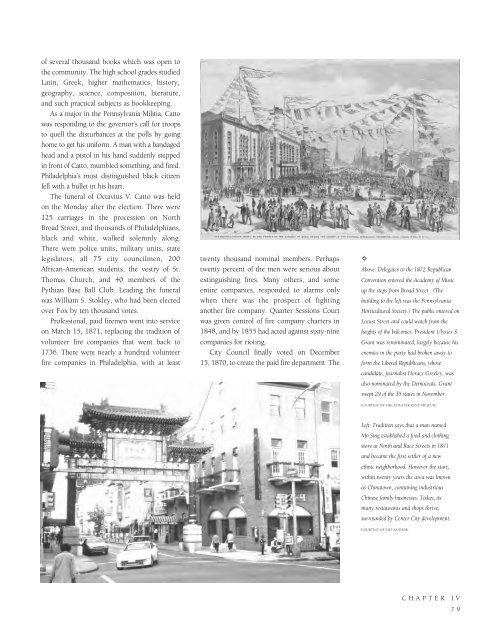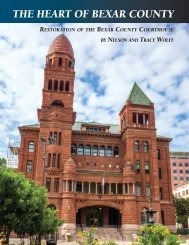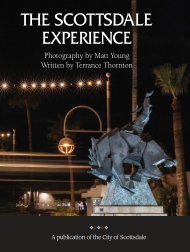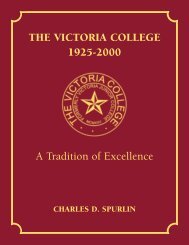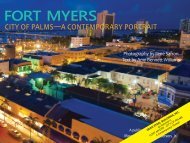Historic Philadelphia
An illustrated history of the city of Philadelphia, paired with the histories of companies, families and organizations that make the region great.
An illustrated history of the city of Philadelphia, paired with the histories of companies, families and organizations that make the region great.
You also want an ePaper? Increase the reach of your titles
YUMPU automatically turns print PDFs into web optimized ePapers that Google loves.
of several thousand books which was open to<br />
the community. The high school grades studied<br />
Latin, Greek, higher mathematics, history,<br />
geography, science, composition, literature,<br />
and such practical subjects as bookkeeping.<br />
As a major in the Pennsylvania Militia, Catto<br />
was responding to the governor’s call for troops<br />
to quell the disturbances at the polls by going<br />
home to get his uniform. A man with a bandaged<br />
head and a pistol in his hand suddenly stepped<br />
in front of Catto, mumbled something, and fired.<br />
<strong>Philadelphia</strong>’s most distinguished black citizen<br />
fell with a bullet in his heart.<br />
The funeral of Octavius V. Catto was held<br />
on the Monday after the election. There were<br />
125 carriages in the procession on North<br />
Broad Street, and thousands of <strong>Philadelphia</strong>ns,<br />
black and white, walked solemnly along.<br />
There were police units, military units, state<br />
legislators, all 75 city councilmen, 200<br />
African-American students, the vestry of St.<br />
Thomas Church, and 40 members of the<br />
Pythian Base Ball Club. Leading the funeral<br />
was William S. Stokley, who had been elected<br />
over Fox by ten thousand votes.<br />
Professional, paid firemen went into service<br />
on March 15, 1871, replacing the tradition of<br />
volunteer fire companies that went back to<br />
1736. There were nearly a hundred volunteer<br />
fire companies in <strong>Philadelphia</strong>, with at least<br />
twenty thousand nominal members. Perhaps<br />
twenty percent of the men were serious about<br />
extinguishing fires. Many others, and some<br />
entire companies, responded to alarms only<br />
when there was the prospect of fighting<br />
another fire company. Quarter Sessions Court<br />
was given control of fire company charters in<br />
1848, and by 1855 had acted against sixty-nine<br />
companies for rioting.<br />
City Council finally voted on December<br />
15, 1870, to create the paid fire department. The<br />
✧<br />
Above: Delegates to the 1872 Republican<br />
Convention entered the Academy of Music<br />
up the steps from Broad Street . (The<br />
building to the left was the Pennsylvania<br />
Horticultural Society.) The public entered on<br />
Locust Street and could watch from the<br />
heights of the balconies. President Ulysses S.<br />
Grant was renominated, largely because his<br />
enemies in the party had broken away to<br />
form the Liberal Republicans, whose<br />
candidate, journalist Horace Greeley, was<br />
also nominated by the Democrats. Grant<br />
swept 29 of the 35 states in November.<br />
COURTESY OF THE ATWATER KENT MUSEUM.<br />
Left: Tradition says that a man named<br />
Mo Sing established a food and clothing<br />
store at Ninth and Race Streets in 1871<br />
and became the first settler of a new<br />
ethnic neighborhood. However the start,<br />
within twenty years the area was known<br />
as Chinatown, containing industrious<br />
Chinese family businesses. Today, its<br />
many restaurants and shops thrive,<br />
surrounded by Center City development.<br />
COURTESY OF THE AUTHOR.<br />
CHAPTER IV<br />
79


